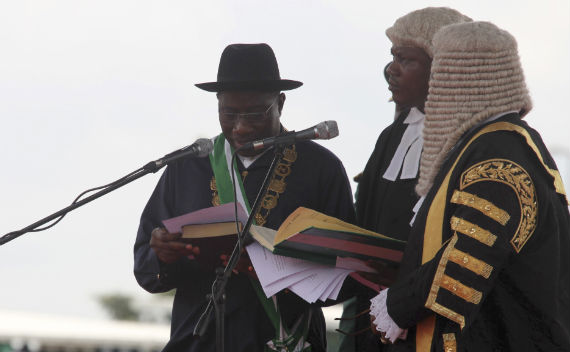Goodluck Jonathan Inaugurated as Nigeria’s President
May 31, 2011 4:51 pm (EST)
- Post
- Blog posts represent the views of CFR fellows and staff and not those of CFR, which takes no institutional positions.
More on:

On May 29, Goodluck Jonathan was sworn in as Nigeria’s third civilian president since the restoration of civilian governance in 1999. The Independent National Electoral Commission declared him president-elect in April 2011, after the international community and many Nigerians saw the polling as credible. But Jonathan’s chief opponent, Muhammadu Buhari, and many in the Muslim North rejected the results, claiming they were fraudulent. Jonathan carried none of the core North ‘Sharia’ states, while Buhari carried none of the middle belt, southern or western states. In the aftermath of the presidential elections, there was bloody rioting across the North that started as political protest but rapidly acquired an ethnic and religious dimension. Human Rights Watch concludes that the elections of 2011 were the bloodiest since the restoration of civilian governance.
Probably Jonathan’s greatest political challenge is to reach out to those parts of the country that do not accept him. Many of the greatest northern power brokers refused to attend his inauguration. Former military chief of state Buhari publicly said he was not attending to register his “dissatisfaction” with the conduct of the elections. Similarly, former military chief of state Ibrahim Babangida was not present, saying he would attend the inauguration of the governor of his native state instead. Also absent were former vice president Atiku Abubakar; former national security advisor Aliyu Mohammed; and the head of the Northern Political leaders Forum, Mallam Adamu Ciroma. Their non-attendance looks coordinated.
On inauguration day, there were bomb attacks in Bauchi, Zaria, Kaduna, and Maiduguri, with those killed numbering up to twenty and numerous others wounded. (All had also been venues of bloody violence in the aftermath of the presidential elections.) There were also bombings in Zuba (near Abuja) and Owerri, the latter allegedly involving the Movement for the Actualization of the Sovereign State of Biafra (MASSOB). While some of the bombings may have been protests against Jonathan, others may have been against various governors, who were also inaugurated on the same day, or, as in Owerri, over local issues.
Jonathan’s inaugural address was short and included a plea for national unity, though it was not conspicuous in its rhetoric for reaching out to the North. Jonathan has not yet formulated his cabinet and his inner circle of advisors. However, those appointments thus far announced include: retired general Andrew Azazi (also a fellow Ijaw), to continue on as National Security Advisor, and Anyim Pius Anyim, who will be secretary of the federation and head of the civil service. Both are Christians from the South. Jonathan has said that he will be the head of his economic team, rather than the finance minister. While the press implies that Jonathan will hold himself that portfolio, I can find no confirmation that he will be his own finance minister. No prominent Northerner beyond the vice president, Namadi Sambo, has yet been named to Jonathan’s new cabinet, though it is still early.
As is usual practice for important occasions, the inauguration opened and closed with prayer. According to press reports, the invocation was given by the Anglican primate of Nigeria, whose prayer asserted that Jonathan’s presidency was the will of God. The Muslim imam closed the ceremonies with a prayer for peace.
More on:
 Online Store
Online Store
